The mission of the Community Garden is multilayered. We aim to serve as an educational space providing student interns and campus community members first-hand opportunities to learn about gardening and small-scale agriculture. Through this education, we aim to raise awareness of local food production, sustainable agriculture, and the campus food cycle. In addition to our educational component we want to help support students by allowing them to have easier access to local food options through our student-run farm stand on campus. And finally, because all of our actions have an impact on larger communities, the CCG serves as a place of interaction and positive engagement that further strengthens the bond between the Colgate community and with our Hamilton neighbors.
But why promote locally grown food or a knowledge of gardening?
Working at the garden, just this summer, we have often heard the question at our farm stands, “Why should I buy my produce here?” With Price Chopper open 24/7, holding a wide selection of reliable produce, it is sometimes hard to imagine why eating locally grown food is better for you and your environment. Here are some reasons that may convince you…
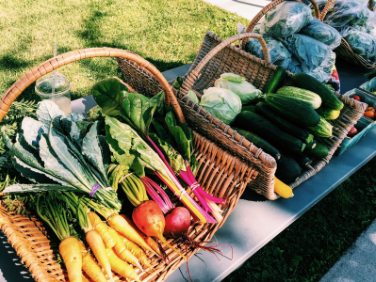
Quality
Local foods have been loosely defined as food that is sourced from a 100-250 mile radius from one’s home. Eating local guarantees you more flavorful and natural tasting foods. Produce and animal-based products grown in local farms are a lot less likely to contain biochemical substances that are normally used at larger factory farming corporations to help maximize product output and their profit. Not only are these chemicals destructive to earth and water systems, but they also change the natural taste and appearance of many naturally delicious herbs and veggies.
Transportation and Emission “costs”
The average American meal travels 1500 miles to get to your plate. Food that is grown only a few miles away from you may travel thousands of miles for processing and packing, only to return back to where it started in the first place (See: How Far Does Your Food Travel to get to Your Plate?) To explain this idea more, check out this article by Alan Durning, that explains the environmental, political, economic, and cultural impacts that a cup of coffee creates before it makes it to your table.
Meanwhile, food from the Colgate Community Garden and other local farms such as Common Thread CSA travels only a handful of miles. Not only does this save monetary costs for both the producer and the consumer, but it also reduces emissions in transportation and factories.
Waste
When food travels overseas or cross-country, producers are not only contributing to carbon emissions but also wasting tons of plastic and non-biodegradable materials on packaging. Food must also stay fresh after all those days and in order to do this, numerous chemicals are added to our food to make sure they appear ‘fresh’.
Waste can also come from the type of foods we choose to eat. In fact, it matters just as much as to how the food is produced. For example, beef requires around 20x more land and water, yet emits 20x more greenhouse emissions while only producing a relatively small amount of calories and protein. We are what we eat, and what we eat has a profound impact on the planet in ways we are hardly aware of.
Knowledge of Growing Methods
When you shop local, you often have the chance to ask the farmer directly what their growing methods are. Do they practice organic methods? What pesticides do they use? How do they treat their animals? The answers to these questions may be important to you and you won’t always get them by shopping at the supermarket. Many laws are in place to protect big corporations from having to share all their methods of growing and raising livestock. Most local farmers have gotten in the business because they believe in their methods and love to share them. Ask us how we grow at the next farm stand!
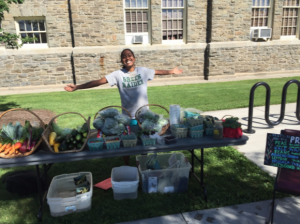
Passing the baton
By sharing sustainable and organic gardening methods to students and community members, as well as sharing a contagious enthusiasm for eating local food, we hope to spread the practice to new adults, and future consumers. In his article, Why Bother, Michael Pollan shares reasons for why it is important to plant your own garden. Besides all the aforementioned benefits, Pollan argues that having your own garden and source of food slowly starts to dismantle our learned dependency on corporations.
“You begin to see that growing even a little of your own food is, as Wendell Berry pointed out 30 years ago, one of those solutions that, instead of begetting a new set of problems–the way “solutions” like ethanol or nuclear power inevitably do–actually beget other solutions, and not only of the kind that save carbon. Still more valuable are the habits of mind that growing a little of your own food can yield. You quickly learn that you need not be dependent on specialists to provide for yourself–that your body is still good for something and may actually be enlisted in its own support. If the experts are right, if both oil and time are running out, these are skills and habits of mind we’re all very soon going to need” (Pollan).
When we break from our dependency on these structures, we find that it is easier, healthier, and more rewarding in so many ways. Hopefully, these initiatives help to spark a larger movement that engages our leaders to research and experiment with new approaches on how to eat and live in a more local and sustainable manner.
Community
We would be remiss if we left out the community aspect of local food production. You will be surprised how many amazing people you will meet at farm stands, gardens, or even just your next door neighbor whose shovel you borrow! We are so thankful for the many community members that make our garden possible and for all the students who have supported our garden by choosing to eat locally.
“At least in this one corner of your yard and life, you will have begun to heal the split between what you think and what you do, to commingle your identities as consumer and producer and citizen. Chances are, your garden will re-engage you with your neighbors, for you will have produce to give away and the need to borrow their tools. You will have reduced the power of the cheap-energy mind by personally overcoming its most debilitating weakness: its helplessness and the fact that it can’t do much of anything that doesn’t involve division or subtraction… The single greatest lesson the garden teaches is that our relationship to the planet need not be zero-sum, and that as long as the sun still shines and people still can plan and plant, think and do, we can, if we bother to try, find ways to provide for ourselves without diminishing the world” (Pollan).
And with that, start planting! Check out local farms in your area! Or come join us in the Colgate Garden. We are always looking for volunteers; our open hours are Tuesdays from 12-2pm and Thursdays 4:30-6:30pm.
Our next work party will be on August 3rd from 5-7. Come to the garden, meet new people, and eat good food! Our farm stand continues to be outside of Trudy Fitness Center on Broad Street, Tuesdays 4:30-6:30pm. If raining, we will be inside the fitness center near the check-in desk.
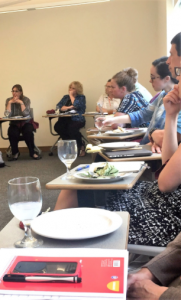



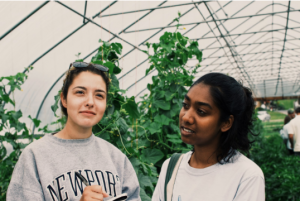
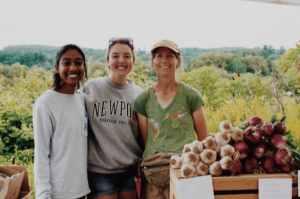 Additionally, by rotating their crops every season, they avoid depleting the soil of its resources, giving them soil time to replenish itself each season. Common Thread also uses their own compost, irritates with a spring-fed pool, and only uses organic pesticides when they are absolutely necessary.
Additionally, by rotating their crops every season, they avoid depleting the soil of its resources, giving them soil time to replenish itself each season. Common Thread also uses their own compost, irritates with a spring-fed pool, and only uses organic pesticides when they are absolutely necessary.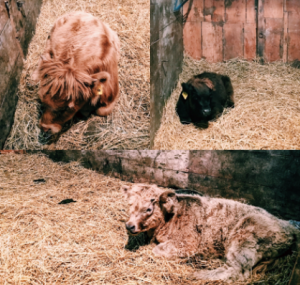 Our next stop was Drover Hill Farm, located in Earlville, NY. Drover Hill is one of the only pasture-raised cattle farms in the area. Cows that are not raised on grass are often fed grains and supplements to speed up their growth. This diet is unhealthy for the cows as their bodies were not built to digest these products as well. Pasture-fed cows, such as those at Drover produce healthier, leaner meats, as well as a production cycle that benefits the environment, as less energy goes into growing grass than grain.
Our next stop was Drover Hill Farm, located in Earlville, NY. Drover Hill is one of the only pasture-raised cattle farms in the area. Cows that are not raised on grass are often fed grains and supplements to speed up their growth. This diet is unhealthy for the cows as their bodies were not built to digest these products as well. Pasture-fed cows, such as those at Drover produce healthier, leaner meats, as well as a production cycle that benefits the environment, as less energy goes into growing grass than grain.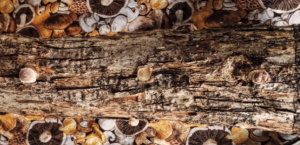 The process to grow shiitake mushrooms in logs is a long but very interesting journey. First, a fresh log of hardwood, usually maple or oak, must be found. It’s important that the log is a hardwood because the bark needs to be tough and hardy so it will stay on for a long period of time. One inch holes are drilled and inserted with shiitake mycelium which comes from cultures they grow and sawdust.
The process to grow shiitake mushrooms in logs is a long but very interesting journey. First, a fresh log of hardwood, usually maple or oak, must be found. It’s important that the log is a hardwood because the bark needs to be tough and hardy so it will stay on for a long period of time. One inch holes are drilled and inserted with shiitake mycelium which comes from cultures they grow and sawdust.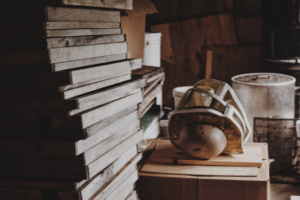 This small, family run apiary is located in Eaton, NY. Johnston started his operations after working on a commercial farm as a young man. After retirement, he decided to continue his passion for working with bees and started his own business. The bee business isn’t a painless one. Johnston spoke about getting stung up to 200 times a day. Yet, his respect and care for the bees were clear. Often times, he wore nothing but a face-net when out in the hives, knowing that his bare hands and skin would make him interact with the bees more carefully and gently.
This small, family run apiary is located in Eaton, NY. Johnston started his operations after working on a commercial farm as a young man. After retirement, he decided to continue his passion for working with bees and started his own business. The bee business isn’t a painless one. Johnston spoke about getting stung up to 200 times a day. Yet, his respect and care for the bees were clear. Often times, he wore nothing but a face-net when out in the hives, knowing that his bare hands and skin would make him interact with the bees more carefully and gently. 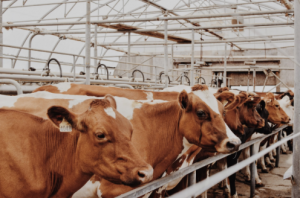 Our last stop of the day was Red Gate Farm, which has been around for 16 years. This dairy farm is home to 360 cows, who are milked twice a day. The rest of their days are filled with grass grazing and milk production. Red Gate also used an underground tunnel to move the cows from pasture to milking room without putting them in danger of traffic and busy streets. At the end of our visit, we enjoyed some incredible salted butter, cream, and buttermilk products made right at the farm!
Our last stop of the day was Red Gate Farm, which has been around for 16 years. This dairy farm is home to 360 cows, who are milked twice a day. The rest of their days are filled with grass grazing and milk production. Red Gate also used an underground tunnel to move the cows from pasture to milking room without putting them in danger of traffic and busy streets. At the end of our visit, we enjoyed some incredible salted butter, cream, and buttermilk products made right at the farm!
